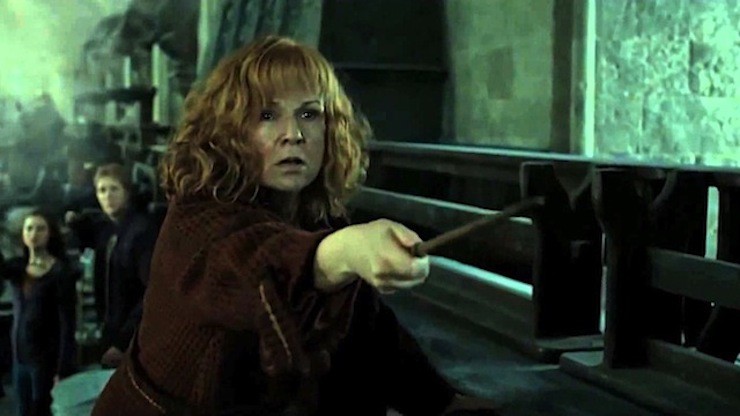Last year, I became a parent. The birth of my child was a transformative experience, and, since then, I’ve been drawn to stories about parents — their relationships with their children, the way parenthood affects their decisions, the endless possibilities for familial relationships. The day your first child is born, you wake up as Bilbo Baggins — naive, selfish — but then, suddenly, you are thrust into the role of Gandalf — teacher, protector.
Science Fiction and Fantasy is full of parents — loving parents (Lily Potter) and awful parents (King Robert Baratheon), incredible parents (Cordelia Vorkosigan) and mysterious parents (Tam al’Thor), and all around kickass parents (Zamira Drakasha). Parenthood affects them all differently, challenges their motivations, and changes the way they interact with the world around them. Without children, they would all be dramatically different people (even King Robert).
Today, I’m going to look at four fantasy novels and one series that feature kickass/brilliant/funny/interesting moms. They all have different roles—live in societies with varying expectations—but one thing is consistent: they’re brave, impressive, and they have huge impacts on the world around them. They send ripples through the lives of those they touch — they’re powerful, and it’s difficult not to feel inspired by their actions, or awed by their courage. Some hit like a boulder, others as delicately as the breath of a butterfly’s passing, but the world in their wake is always changed.
Dragonsbane by Barbara Hambly
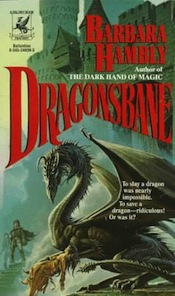 Throughout Dragonsbane, Jenny Waynest struggles to reconcile her role as both a mother and a witch. Many mothers are thrown into narratives that require or expect them to act entirely in the interests of their children or family, but Jenny ponders, and acts, selfishly at a few key moments. The reader can feel the her agony when she’s asked to decide between her family and her profession. Through Jenny, Hambly questions societal expectations of women, and examines how the responsibility of parenthood intersects with parents’ individuality.
Throughout Dragonsbane, Jenny Waynest struggles to reconcile her role as both a mother and a witch. Many mothers are thrown into narratives that require or expect them to act entirely in the interests of their children or family, but Jenny ponders, and acts, selfishly at a few key moments. The reader can feel the her agony when she’s asked to decide between her family and her profession. Through Jenny, Hambly questions societal expectations of women, and examines how the responsibility of parenthood intersects with parents’ individuality.
Jenny sacrifices a lot for her children — power and prestige, adventure, answers — but despite her decision to raise her family — to spend life alongside (or, some might argue, in the shadow of) John Aversin, the Dragonsbane and father of her children — Jenny exudes confidence and proves able to thrown down with the best of them, leading to some epic confrontations during the novel’s climax.
Updraft by Fran Wilde
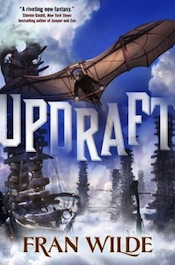 Ezarit is a respected and influential member of Densira, the tower where she lives with her daughter, Kirit, and well known among the neighbouring towers, where she flies on a regular basis as a trader. She is a model of inspiration for others in her community — she takes risks for the betterment of the tower, she’s fearless, brave, and loving. And nobody looks up to Ezarit more than Kirit, who hopes one day to be apprenticed to her mother as a trader. This drive serves as a central motivation during the early parts of Updraft, and helps to build a sense of awe for the winged-trader among readers.
Ezarit is a respected and influential member of Densira, the tower where she lives with her daughter, Kirit, and well known among the neighbouring towers, where she flies on a regular basis as a trader. She is a model of inspiration for others in her community — she takes risks for the betterment of the tower, she’s fearless, brave, and loving. And nobody looks up to Ezarit more than Kirit, who hopes one day to be apprenticed to her mother as a trader. This drive serves as a central motivation during the early parts of Updraft, and helps to build a sense of awe for the winged-trader among readers.
As the novel progresses, Kirit struggles through the changing relationship she has with her mother as she learns that giants do not always stand tall and growing up is difficult. Wilde does a wonderful job of centering Updraft’s plot around this incredible woman while keeping her tantalizingly mysterious.
Skinwalkers by Wendy N. Wagner
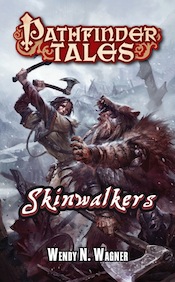 Skinwalkers is Jendara’s novel. A former pirate living a quiet life among the people she once abandoned, Jendara cast off her old life — of risk and violence — to give her son, Kran, a better childhood than she had. In doing so, Jendara makes the classic mistake of smothering her son in an effort to keep him safe. But, as she learns throughout the novel, Kran, despite a disibility that he must overcome, is strong in the same ways she is.
Skinwalkers is Jendara’s novel. A former pirate living a quiet life among the people she once abandoned, Jendara cast off her old life — of risk and violence — to give her son, Kran, a better childhood than she had. In doing so, Jendara makes the classic mistake of smothering her son in an effort to keep him safe. But, as she learns throughout the novel, Kran, despite a disibility that he must overcome, is strong in the same ways she is.
What’s wonderful about Jendara is the way her son looks to her for inspiration. He wants to learn to hunt like she does. He wants to follow in her footsteps, to be like her. The scenes between them are filled with love and adoration, and it’s so refreshing to see a young boy looking up so dearly at his mother. And, through it all, Jendara is a force to be reckoned with as she delves deeper into the mystery of the Skinwalkers who threaten her people. Hell hath no fury like a mom and her axe.
Daggerspell by Katharine Kerr
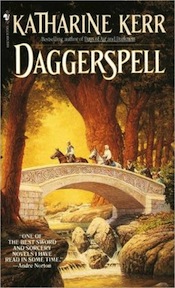 Lovyan manages to exert tremendous influences on the events around her through her keen intelligence, honour, and pragmatism. She’s a born leader, and gathers power and influence around her from all corners.
Lovyan manages to exert tremendous influences on the events around her through her keen intelligence, honour, and pragmatism. She’s a born leader, and gathers power and influence around her from all corners.
As Kate Elliott once described her, Lovyan “does not swing a sword. She rules. She rules over a collection of lesser lords (all landed) with a full understanding of the ways in which her situation gives her power and the ways in which she has to carefully negotiate her position because she is a woman. […] Lovyan proves herself as a good ruler even while Kerr makes it clear that her being a woman makes her situation precarious.”
The events in Daggerspell would play out very, very differently if Lovyan was not the courageous, loving, and just mother and leader that readers are delightfully introduced to.
Dagger and the Coin series by Daniel Abraham
 In The Dragon’s Path, the first volume of Dagger and the Coin, Clara Kalliam is introduced to readers as Duke Kalliam’s wife. She is not a viewpoint character, and, aside from her husband’s impressions, readers do not get a glimpse at her true wile and courage until the rug is pulled out from under her.
In The Dragon’s Path, the first volume of Dagger and the Coin, Clara Kalliam is introduced to readers as Duke Kalliam’s wife. She is not a viewpoint character, and, aside from her husband’s impressions, readers do not get a glimpse at her true wile and courage until the rug is pulled out from under her.
Her fall from grace as a result is swift, but there’s a terrific resilience in Clara as she discovers that though her traditional place of authority has been stripped from her, a truer power has replaced it: freedom. Where some of the other women on this list often match their male counterparts blow-for-blow in physical prowess and martial proficiency, Clara is untrained as a fighter, and possess no aptitude for weapons or fighting. Instead, she manipulates the flow of power around her through social machinations, keen spywork, and bold political alliances.
From the second volume on, Clara becomes an incredible force on her own, separating her legacy from her husband’s, and cementing her as one of Abraham’s most intriguing characters.
In preparing for this post, I asked Twitter for their favourite novels featuring kickass/brilliant/funny/interesting mothers, and the response was overwhelming with novels I’ve yet to enjoy—Lady Jessica from Dune (Frank Herbert), Ista from Paladin of Souls (Lois McMaster Bujold), and Mrs. Weasley from Harry Potter (J.K. Rowling) were some of the most popular.
Who’s your favourite mother from a science fiction or fantasy novel?
Aidan Moher is the Hugo Award-winning editor of A Dribble of Ink, a blog about science fiction and fantasy, and author of Tide of Shadows and Other Stories. He lives on an island in British Columbia with his wife and daughter.










